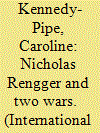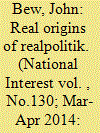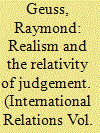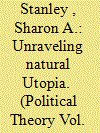| Srl | Item |
| 1 |
ID:
176034


|
|
|
|
|
| Summary/Abstract |
Nicholas Rengger spent much of his career thinking and writing on the phenomenon of war. Eschewing any optimistic view that war could be abolished he also challenged the application of Just War theory to explain and justify the use of military force after the events of 9/11. His intellectual interactions with Jean Bethke Elshtain highlighted his growing unease with those in International Relations who sought to render palatable the use of torture, extraordinary rendition and technological ‘fixes’ in the pursuit of Western interests.
|
|
|
|
|
|
|
|
|
|
|
|
|
|
|
|
| 2 |
ID:
128007


|
|
|
|
|
| Publication |
2014.
|
| Summary/Abstract |
IN 1934, a young British historian published his first book, The Italian Problem in European Diplomacy, 1847-1849. In it, he announced that a nation's foreign policy "is based upon a series of assumptions, with which statesmen have lived since their earliest years and which they regard as so axiomatic as hardly to be worth stating." It was the duty of the historian, he wrote, "to clarify these assumptions and to trace their influence upon the course of every-day policy."
|
|
|
|
|
|
|
|
|
|
|
|
|
|
|
|
| 3 |
ID:
138080


|
|
|
|
|
| Summary/Abstract |
E.H. Carr contrasts ‘realism’ with ‘utopianism’ in his major work in theorising international relations, but he ought to have contrasted it with ‘moralism’, which is a complex set of attitudes that give unwarranted priority to moral considerations in explaining and justifying human action. ‘Moralism’ is a flawed approach to politics. One should distinguish it from ‘utopianism’, which is made up of different strands, not all of which are equally problematic. One strand which has been historically important was centred around an attempt to describe and realise a perfect unchanging society, and Carr seems to have this in mind primarily when he speaks ‘utopianism’. However, there has been another strand which has focused on the social construction of ‘impossibility’ in politics, and our potential ability to undo that construction. Such utopianism is compatible with realism.
|
|
|
|
|
|
|
|
|
|
|
|
|
|
|
|
| 4 |
ID:
113813


|
|
|
|
|
| Publication |
2012.
|
| Summary/Abstract |
The world has now experienced what could be regarded as 20 years of Institutional Liberalism: the dominance of the view that cooperation in world politics can be enhanced through the construction and support of multilateral institutions based on liberal principles. E. H. Carr was famously skeptical of liberalism as he understood that tradition. This essay, prepared originally as the E. H. Carr Lecture at Aberystwyth University, interrogates Institutional Liberalism through a lens provided by Carr's most famous book on international relations, The Twenty Years' Crisis. It points out three trends since the 1990s that may be associated with Institutional Liberalism: increasing legalization; trends toward more legalism and moralism; and a decline in the coherence of some international regimes. Reviewing these trends in light of Realist critiques of liberalism, the essay rejects Realism as a good moral or practical guide to world politics, but reaffirms the value of the Realist view that institutions depend on structures of power and interests. Increases in legalization, legalism and moralism reflect a fusion of the social purpose of liberal democracies with their unprecedented geopolitical power since 1991. But declines in the coherence of international regimes reflect a greater divergence of interests, weighted by power. All international institutions are flawed and in some ways precarious, but strengthening them in ways that reflect legitimate social purposes remains a major challenge for our time.
|
|
|
|
|
|
|
|
|
|
|
|
|
|
|
|
| 5 |
ID:
087439


|
|
|
|
|
| Publication |
2009.
|
| Summary/Abstract |
Diderot's Supplement to the Voyage of Bougainville has often been read as a Rousseauian condemnation of modern civilization judged against the standard of pure Nature. A cursory reading of the Supplement does appear to present Tahiti as a natural utopia and Europe as a civilized prison. This essay rejects such a reading by demonstrating that the Supplement actually undermines any clear opposition between virtuous nature, represented by Tahiti, and corrupt civilization, represented by Europe. Although Diderot truly does offer a stinging critique of modern Europe, he refuses to offer "nature" as a redemptive alternative. Instead, the Supplement offers an implicit critique of the politics of moralism.
|
|
|
|
|
|
|
|
|
|
|
|
|
|
|
|